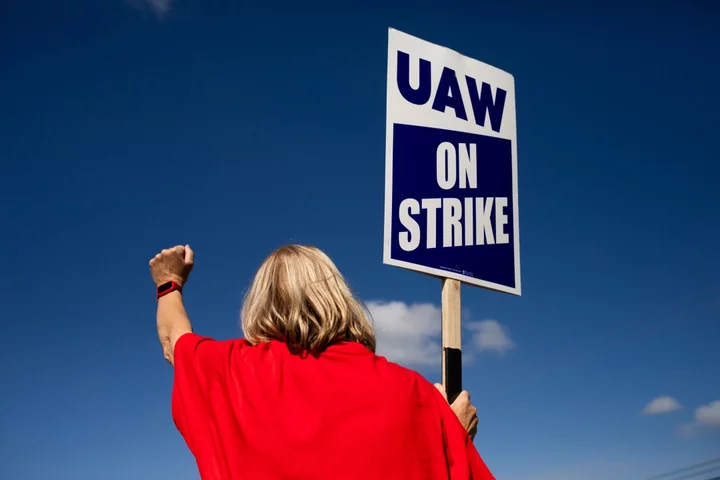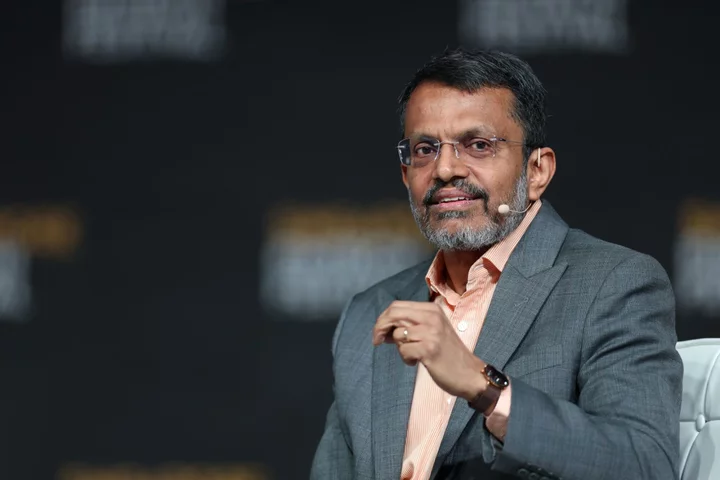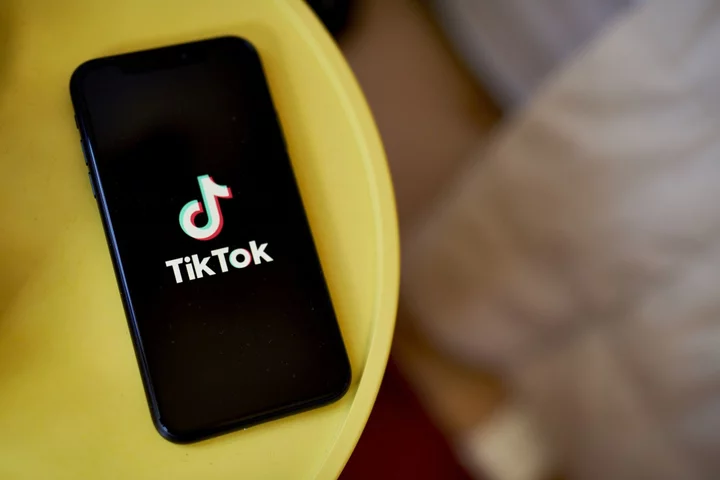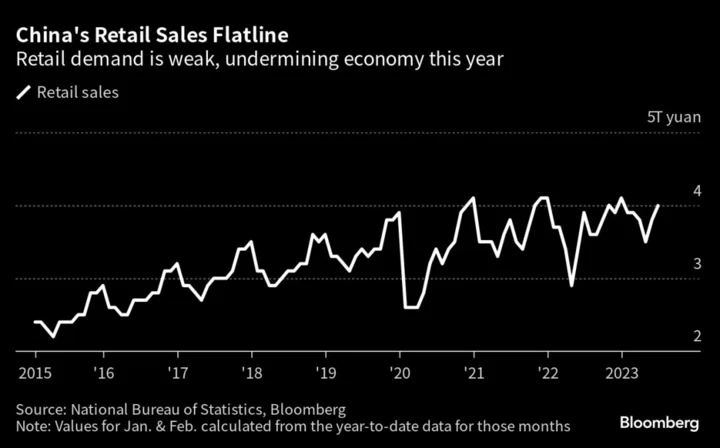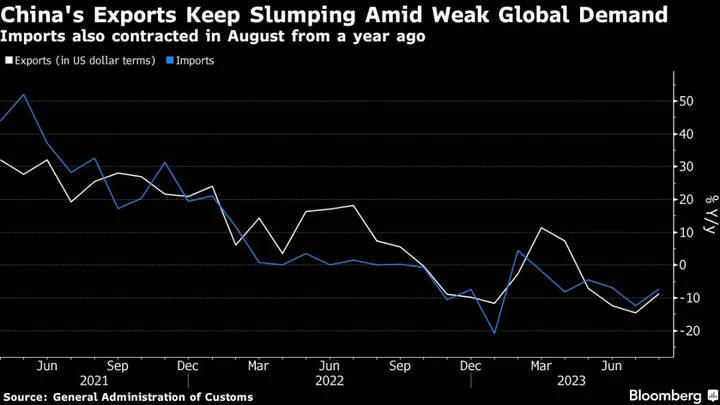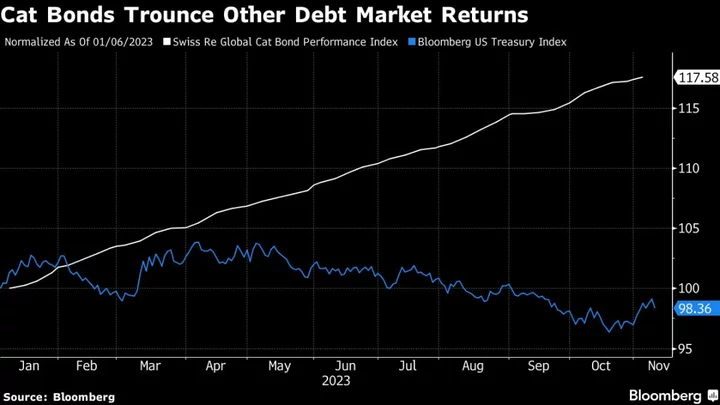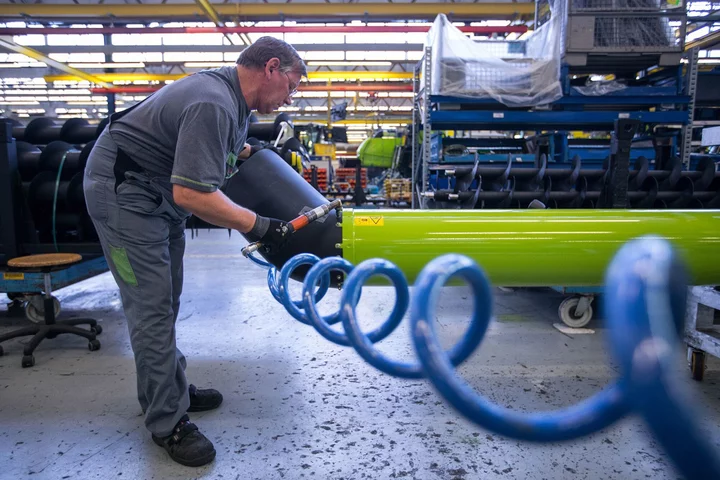Ford Motor Co. Chief Executive Officer Jim Farley accused the United Auto Workers of holding talks hostage over issues not governed by their contract, as tensions rose between the union and two of Detroit’s biggest carmakers.
The strike enters its third week with negotiations now pivoting to a more existential issue between the union and its largest employers: the fate of workers in an electric future.
While economic issues remain, the union wants a framework for the employees of battery plants that don’t yet exist and guarantees for those who make engines and transmissions and other parts that may one day become obsolete. That’s increasing the tension despite progress in other areas.
“What’s really frustrating is, I believe we could have reached a compromise on pay and benefits, but so far, the UAW is holding the deal hostage over battery plants,” Farley said in a webcast. “Keep in mind these battery plants don’t exist yet.”
In response, UAW President Shawn Fain said the union remains on strike over pay, job security and retiree issues.
“I don’t know why Jim Farley is lying about the state of negotiations,” Fain countered in a statement. “It could be because he failed to show up for bargaining this week, as he has for most of the past ten weeks. If he were there, he’d know we gave Ford a comprehensive proposal on Monday and still haven’t heard back.”
The union remains on strike at a Stellantis NV plant in Toledo and its distribution facilities that feed repair parts to dealers. On Friday, it expanded the walkout to two additional General Motors Co. and Ford plants, but spared Jeep maker Stellantis from additional walkouts after what it called a last-minute breakthrough.
The union sees battery joint ventures as an end run around the master labor contract. Farley noted that only one plant — a planned battery facility in Michigan — is owned by Ford. The others are joint ventures with Asian battery partners. The same is true for GM, whose Ultium LLC plants are jointly owned with South Korea’s LG Energy Solution.
Since those joint ventures aren’t wholly owned, they would have to win majority support from those workers, as they did in an election at an Ultium plant in Lordstown, Ohio.
New Targets
The newly targeted facilities are a Ford factory in Chicago that produces the Explorer sport-utility vehicle and a GM plant in Lansing, Michigan, that manufactures the Chevrolet Traverse, Fain said Friday.
The union had also planned to strike at Stellantis, according to officials briefed on the matter, but changed course right before Fain’s announcement Friday morning, which was delayed due to the negotiations. The union chief commended Stellantis for making progress in the talks.
“We are excited about this momentum at Stellantis and hope it continues,” Fain said in a livestreamed briefing. “Moments before this broadcast, Stellantis made significant progress on cost of living allowance, right not to cross picket lines as well as the right to strike over product commitments and plant closures and outsourcing moratoriums.”
The additional strikes took effect as of noon local time in Detroit. Ford shares fell 1.1% in New York on Friday. Stellantis’ US shares slipped 0.7% and GM dropped 0.6%.
The UAW wants to emerge from the strike with at least a 30% pay raise, Bloomberg News has reported, down from the 40% hike it initially proposed. That would still be significantly more than they’ve received in prior years. The three carmakers have each offered about 20% more pay.
The Fallout
The strikes began Sept. 15. Before Friday, workers at 41 plants, including all of Stellantis’ and GM’s parts distribution centers in the US, had walked off the job. The strike already has affected 18,000 of the UAW’s 146,000 members at the three carmakers, and the two new plants will put an additional 7,000 on picket lines. It’s the first time all three of Detroit’s legacy automakers have been targeted simultaneously.
Ford typically makes about 5,700 vehicles weekly at its Chicago plant while GM’s Lansing plant makes about 3,600 vehicles per week, according to GlobalData Plc. As of Thursday, GlobalData estimates that the strike had cost Ford 8,000 vehicles in lost output, compared with 15,405 vehicles for GM and 12,900 for Stellantis.
Ford was not alone in expressing frustration with the process. GM signaled its unhappiness with the UAW’s latest salvo and said in a statement it was anxious to reach a deal that “doesn’t let the non-union manufacturers win” — a reference to rivals such as Tesla Inc. and foreign auto brands with US factories.
GM CEO Mary Barra accused UAW leadership of dragging out the strike longer than necessary as part of a plan to “further their own personal and political agendas.”
“It is clear Shawn Fain wants to make history for himself, but it can’t be to the detriment of our represented team members and the industry,” Barra said in an emailed statement. “We need the UAW leadership at the bargaining table with the clear intent of reaching an agreement now.”
Each of the companies is negotiating separately on its own four-and-a-half-year contract, but they’re closely watching each other’s moves. Last week, Fain said talks with Ford were making progress and it was spared when the strike expanded to more locations.
Stellantis, which had shown little movement since the company offered about a 20% raise on the eve of the strike, was able to avoid a spread of the strikes on Friday when it made concessions on key issues.
“We have made progress in our discussions, but gaps remain,” the carmaker said in an emailed statement.
The right to strike over plant closures had been a key point of contention in the talks, with Chief Operating Officer of North America Mark Stewart arguing early on that the company wants to be able to “make the decision on product allocation and where it goes.”
CEO Carlos Tavares, who has made a point of delegating negotiations to Stewart, traveled to Detroit this week for a board meeting, but didn’t meet with Fain, according to a person familiar with the matter.
Expanded walkouts run the risk of depleting the UAW’s strike fund too quickly. Striking workers get $500 a week under union rules, and the fund had about $825 million in it when the strike began.
--With assistance from Catherine Larkin, Albertina Torsoli and Josh Eidelson.
(Updates throughout.)

